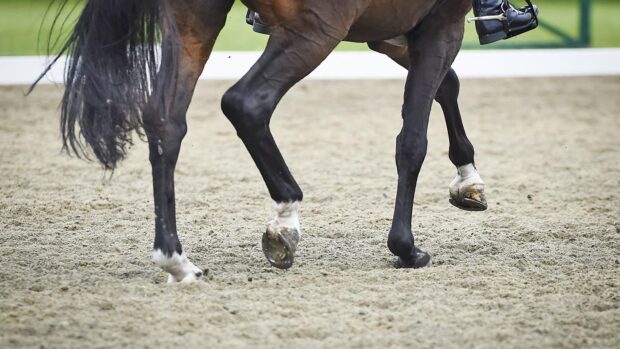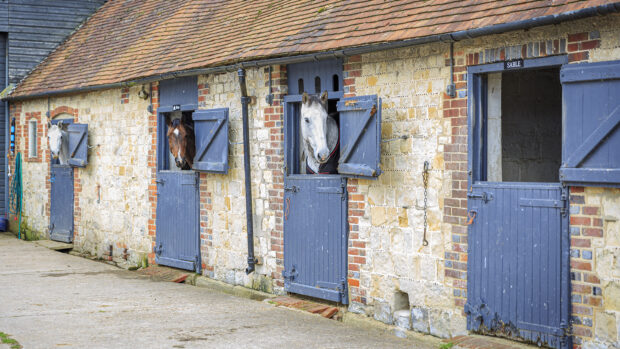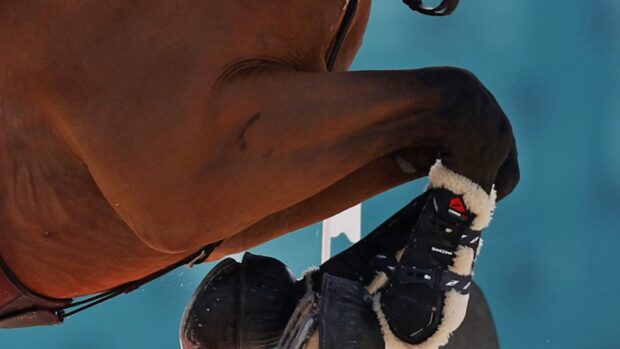Nine horses are receiving “close monitoring” in hospital in Valencia – eight of whom are showing neurological signs of equine herpes virus (EHV-1).
H&H reported that the organisers of the Mediterranean Equestrian Tour in Oliva Nova, Spain, had cancelled the second part of the showjumping tour (7-26 February) as four horses on site had tested positive for EHV-1. Ten horses, six of whom were showing signs of illness, were put in isolation on 21 February. Swabs were taken, four of which were positive, four negative and two inconclusive. At the time none of the horses were showing signs of neurological illness.
The Valencia Veterinary department decided that all the horses stabled in the same tent as the four that had tested positive had to remain on the venue for at least one week.
In an FEI update on 2 March a spokesman said the Oliva organising committee had set up a “strong organisation” and continues to closely collaborate with the authorities, the national federation and the FEI. The Spring MET III Tour (7-26 March) has been cancelled and the organising committee has put meetings in place to keep all athletes informed on the most recent development.
The spokesman added that the venue is operating under the auspices of the regional veterinary authority, which is monitored by the federal veterinary authority, MAPA. An FEI vet has been appointed as responsible for the venue, leading the work on site and reporting back to the regional veterinary authority.
“To date, there are nine horses at the University Equine Hospital in Valencia (CEU) for close monitoring, eight of which have displayed neurological signs. As a preventive measure and to ensure enough treating space, the FEI has ordered 12 temporary boxes to be set up at the hospital grounds in case more horses are brought in,” said the FEI spokesman, adding that 103 horses remain at the venue in Oliva, and these have been divided into groups depending on their health status.
“The temperature of all horses at the venue is taken two to three times daily, and in the latest report from 1 March, no horse had presented fever or any clinical signs.”
MAPA, supported by the FEI, has extended the initial safety measures to avoid a further spread of virus from the venue. To leave the venue, horses must present a negative sample, followed by a second sample 14 days later, and a third on day 15. All three samples must be negative for EHV.
To be unblocked from the FEI database and return to competition horses must fulfil certain health requirements; either 21 days’ isolation with a nasopharyngeal sample taken on day 21 at the earliest – or a minimum isolation of 14 days, with a sample taken on day seven, and a second sample taken seven days later at the earliest. All samples must be analysed by a PCR and return negative. The measures also include twice-daily rectal temperatures.
“Release from isolation” can only take place on the advice of a vet, and to be compete at an FEI event, horses need to complete with all the return to competition precautions and have the restriction lifted by the FEI vet department.
In Lier, Belgium, where one horse had tested positive, the venue has been “given the green light” to reopen for competitions following an inspection by the Belgian national head vet. The affected horse, and each of the 25 in-contact horses, may not attend any FEI events under they have fulfilled “certain health requirements”, which are imposed in order to minimise any potential transmission of the virus, to their own horses and the wider horse population.
Discussing the current status of the spread of the disease, the FEI spokesman confirmed seven horses departed Oliva prior to the first confirmed case of EHV-1; one travelled to Valencia, Spain, four to Vejer de la Frontera, Spain, and two to Doha, Qatar.
“They were immediately isolated on request of the FEI and are currently applying the FEI return to competition protocols while in isolation. To date, none of the horses have been reported to present fever or clinical signs,” he said.
The spokesman added that six horses returning from Oliva to Limburg, the Netherlands, have tested positive for EHV-1 and have been placed in quarantine, where they are being closely monitored.
“Unrelated to Oliva, in Vilamoura, Portugal, two horses with fever were placed in isolation, however their test results for EHV-1 were negative,” he said.
You might also be interested in:

Major showjumping tour cancelled after horses test positive for equine herpes virus

EHV prompts temporary British competition ban for horses returning from affected shows

Equine herpes virus: what you need to know right now
Practical advice on recognising the early signs of equine herpes virus and when it is best to vaccinate

Subscribe to Horse & Hound magazine today – and enjoy unlimited website access all year round
Horse & Hound magazine, out every Thursday, is packed with all the latest news and reports, as well as interviews, specials, nostalgia, vet and training advice. Find how you can enjoy the magazine delivered to your door every week, plus options to upgrade your subscription to access our online service that brings you breaking news and reports as well as other benefits.



